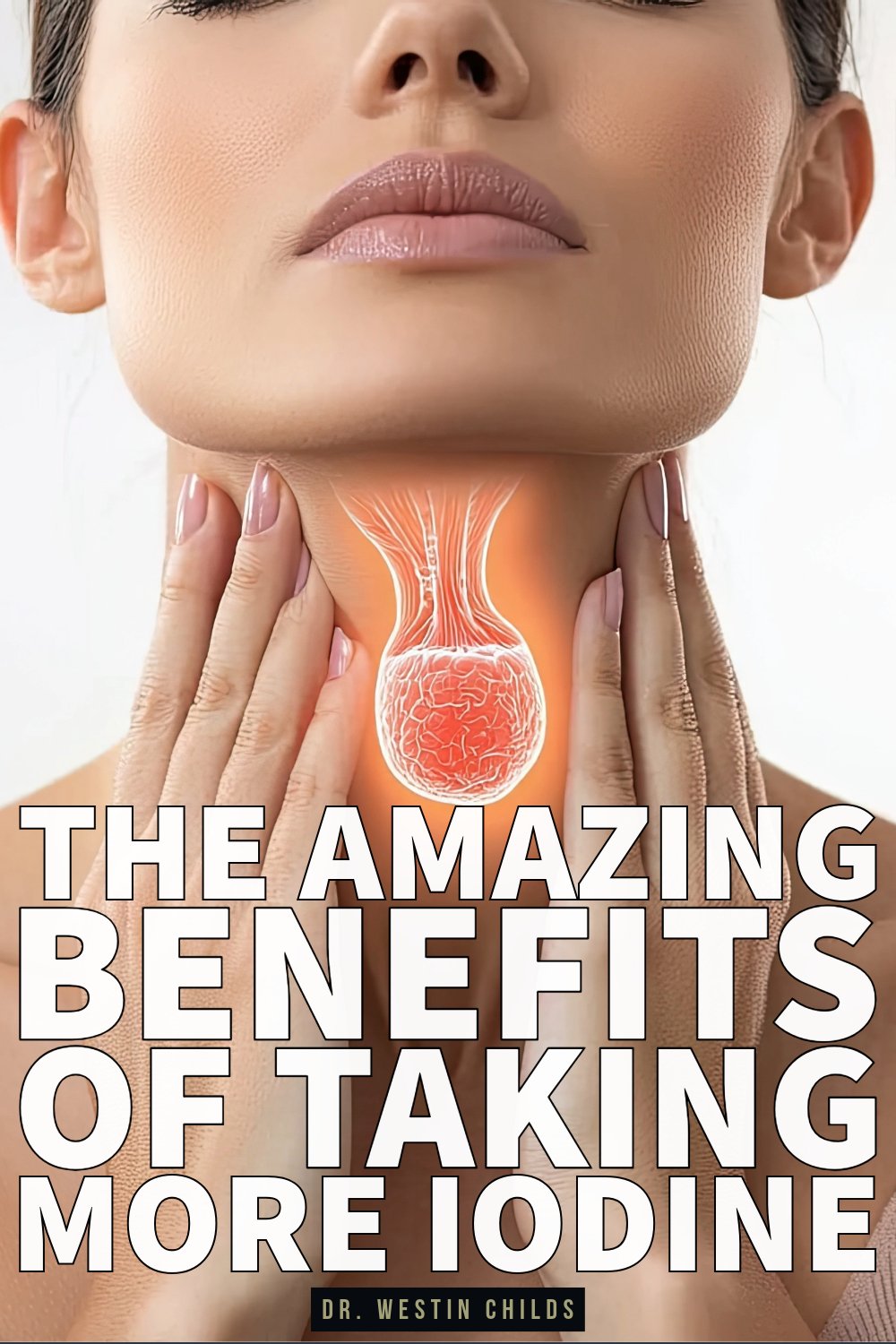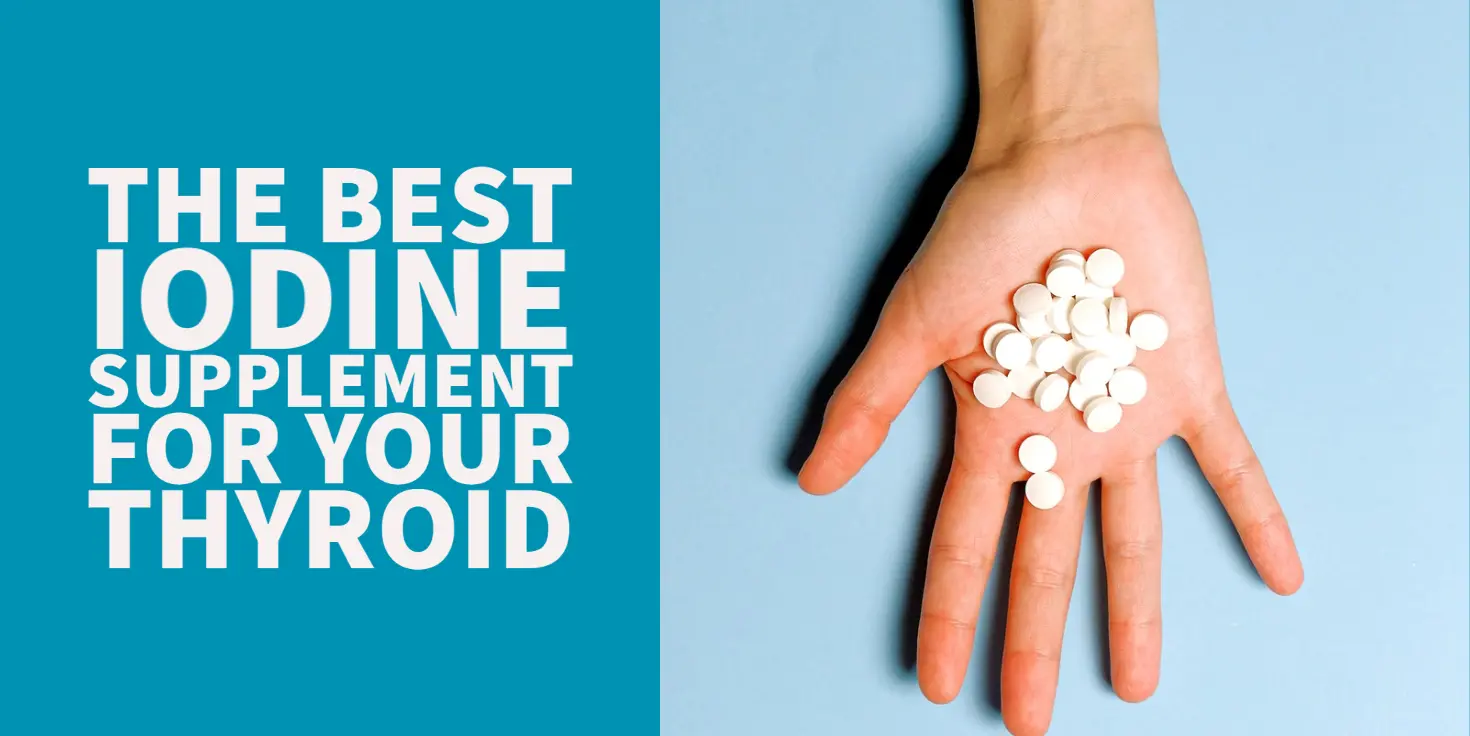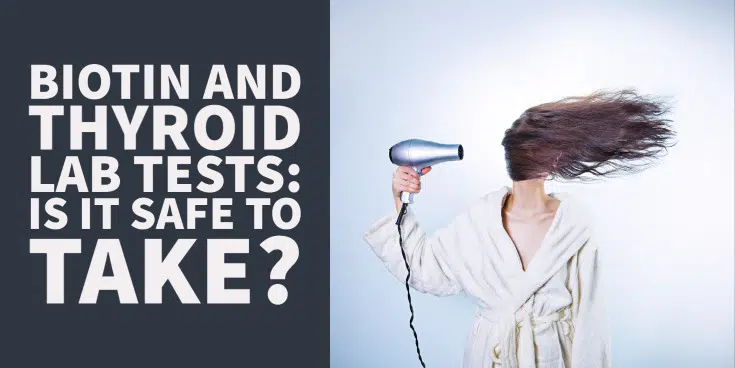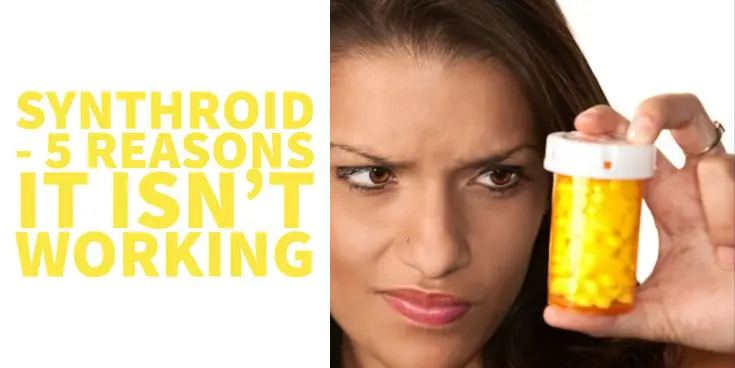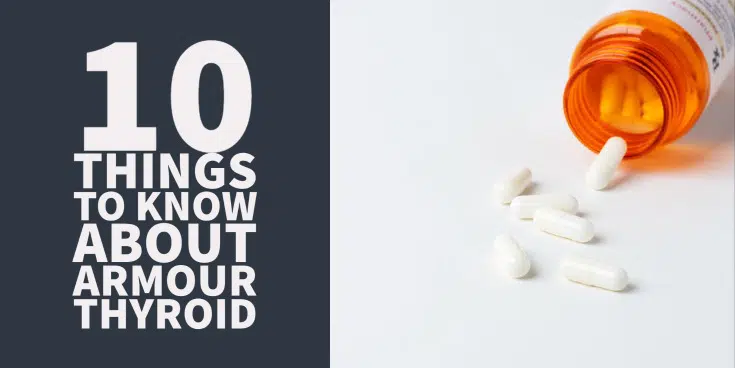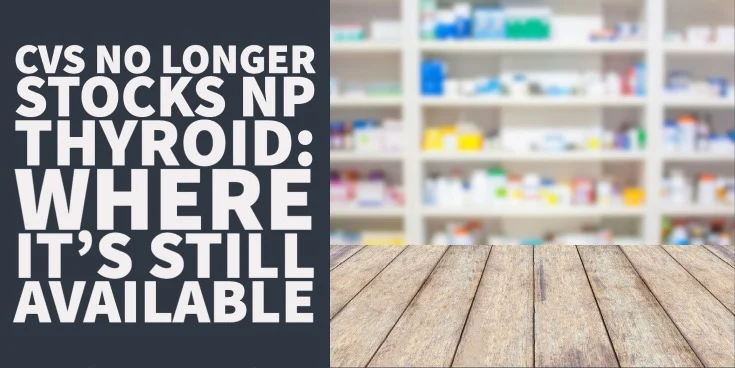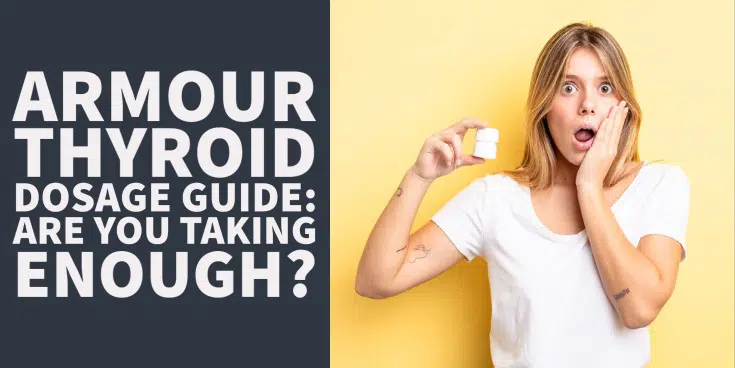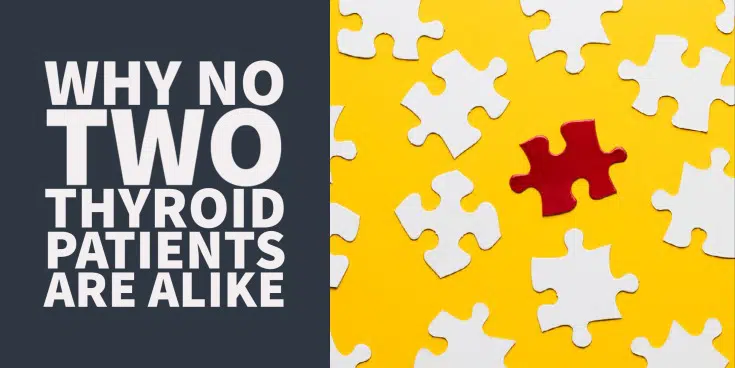Iodine is the single most important nutrient for managing almost all of the hormones in your body.
We don’t normally think about iodine as impacting your hormones, but it absolutely does.
Through its impact on the regulation of thyroid hormone, iodine has downstream effects on estrogen, progesterone, and even cortisol.
That’s great and all, but what does it have to do with you?
Well, for starters, how about the fact that many people (probably even you) may not be getting enough iodine?
Or how about the fact that supplementing with it may help balance your hormones and help you lose weight more easily?
For these reasons, it’s worth knowing a little bit about this important mineral.
Iodine Benefits
The good news is that replacing iodine levels in patients who have suboptimal or even deficient iodine levels results in the rapid reversal of many of the symptoms listed above.
And this is where supplementing with iodine can be particularly helpful – in the reduction of those symptoms.
In many cases in which I’ve used iodine as a therapy in hypothyroid patients, the benefits tend to be an improvement (and reduction) in hypothyroid-like symptoms.
In some patients, this can manifest as an increase in energy, a reduction in hair loss, an increase in hair loss, etc.
The positive side effects of iodine supplementation largely depend on what kind of symptoms you are experiencing due to the deficiency.
In my own personal case (as a male without hypothyroidism) I found iodine supplementation to significantly improve my symptoms of fatigue and low energy levels.
I attribute much of my own personal gain to adding an iodine/iodide supplement to my regimen which dramatically increases my energy levels.
The same is true of many of the patients I have recommended iodine to as well.
But beyond these positive side effects, supplementing with iodine/iodide can improve other aspects including improved immunity, a reduction in antioxidants, and even improvement in prostate/nerve health/breast tissue/gastric tissue.
You can see an example of how powerful molecular iodide is as an anti-inflammatory agent when compared to ascorbic acid below:
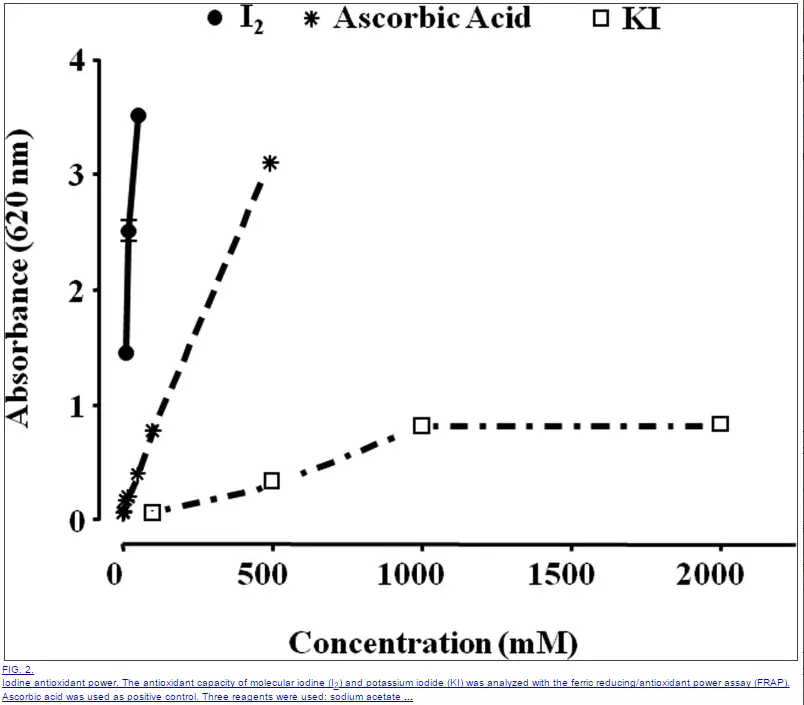
You can also find a complete list of positive side effects and benefits of using iodine/iodide supplementation below:
- Improved metabolism and heat production (20)
- Improved thyroid hormone production (21)
- Reduced symptoms of hypothyroidism
- Increased energy levels
- Increased anti-oxidant power in the body (22)
- Improved cell death of abnormal cells (23)
- Improved breast health (24)
- Improved immunity
- Reduction in chronic/muscle pain
- Bottom line: Supplementing with Iodine and/or Iodide may have multiple positive benefits. The benefits each person experiences will depend on how deficient they are and their own personal symptoms.
Symptoms of Sub-optimal Iodine levels
Let’s be clear:
Iodine is required for proper thyroid hormone production.
The 4 iodine moieties make up the T4 thyroid hormone.
When 1 iodine is cleaved off by the hormone deiodinase you are left with 3 iodine moieties and the active thyroid hormone T3.
If you don’t have these iodine moieties then you simply won’t be able to produce thyroid hormone.
Simply put:
Low iodine (or even suboptimal iodine levels) = low thyroid function
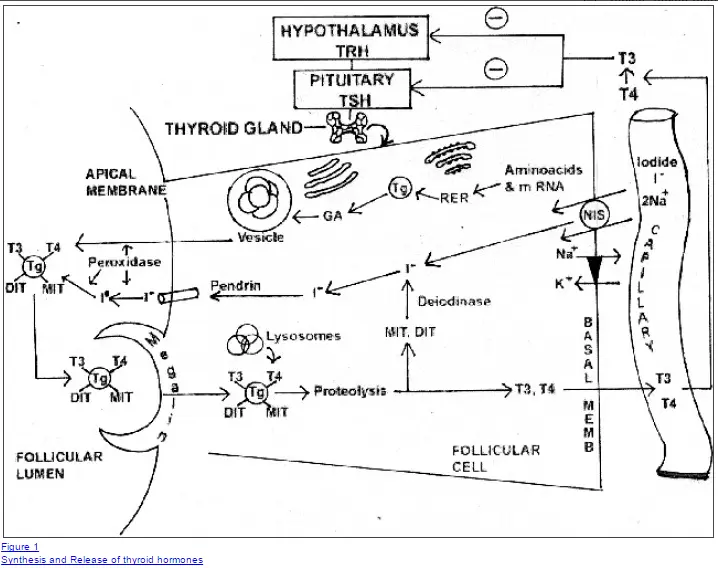
This may explain why some patients experience dramatic improvement when they supplement with iodine.
If their thyroid is low on iodine (suboptimal tissue levels) or if their thyroid is full of other halides (we will talk more about this later) then thyroid hormone production may be limited.
Supplying your body and your thyroid with sufficient iodine levels can open up the floodgates to help create more thyroid hormones.
So we know that iodine is important, but how do you know if you need iodine?
The good news is that there are several ways to figure this out, and one of them is to evaluate your symptoms.
Iodine deficiency (in suboptimal amounts) causes many non-specific symptoms.
Most people focus on the big symptoms of complete iodine deficiency like cretinism, goiter, or mental retardation – but what about patients who have some iodine, but suboptimal levels?
These patients present with different symptoms entirely.
Symptoms of sub-optimal iodine levels:
- Changes in metabolism or weight gain (reduced basal metabolic rate)
- Adult hypothyroidism (including all of the symptoms of hypothyroidism)
- Menstrual problems and menstrual irregularities
- Neurological changes & Impaired mental function (ADD/ADHD or attention problems, depression, anxiety, etc.) (4)
- Fibrocystic breast disease (5)
- Problems with pregnancy including miscarriages, stillbirth, preterm delivery, and congenital abnormalities (6)
- Lower IQ & impaired learning (7)
- Goiter or enlargement of the thyroid gland (8)
What causes Iodine Deficiency?
Much of the confusion surrounding iodine sufficiency and iodine insufficiency comes from this:
How can you be iodine deficient if you live in an area of the world that adds iodine to salt and other products?
How can you be iodine deficient in iodine “replete” areas?
I think we can establish that some patients have suboptimal iodine levels in a number of ways:
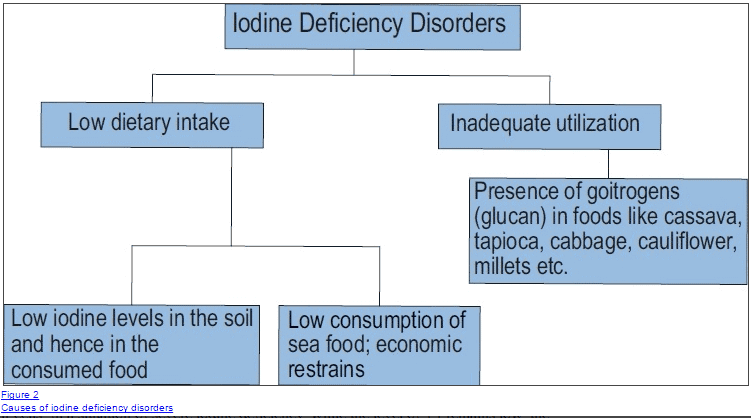
First:
Ingestion of iodine doesn’t necessarily equate to complete utilization of iodine.
Meaning you may be able to take in the appropriate amount of iodine through your diet, but that doesn’t mean that you are adequately utilizing the iodine that you ingest or that the iodine you ingest is even being absorbed.
Changes in hormone levels such as estrogen and testosterone can influence the absorption of iodine.
High estrogen inhibits iodine absorption and testosterone increases iodine absorption (9).
Nowadays with the prevalence of insulin resistance, many patients are walking around with higher-than-normal estrogen levels and lower-than-normal testosterone levels.
Second:
Chemicals that we come into contact with on a daily basis interfere with iodine absorption into the thyroid gland and interfere with thyroid function in peripheral tissues.
This includes compounds like bromide which is found in bread and soft drinks.
And even compounds like perchlorate which is ubiquitous (meaning it’s found all over the place).
Bromide concentrates in the thyroid gland and interferes with proper thyroid hormone production (10) while perchlorates act to decrease iodine entry (11) into the thyroid gland.
This reduction in iodine entry into the thyroid acts to exacerbate insufficient iodine levels in the body and make symptoms worse.
Perchlorates have been found in the following areas in the US: cow’s milk, cucumber, lettuce, soybeans, eggs, and even in prenatal multivitamins.

In addition, small amounts have been found in drinking water (12) in communities in the US.
This isn’t meant to scare you, but simply to illustrate how some patients in iodine “replete” environments may ingest sufficient iodine levels through their diet, but may not be utilizing the iodine correctly.
Third:
Some physiological states require an increased level of iodine due to increased demand and metabolism of thyroid hormone.
A perfect example of this is in pregnant women and in lactating women (13).
During pregnancy, the child has rapid turnover of thyroid hormone in the thyroid gland which results in an increasing demand for iodine in the mother.
Because of this, it is recommended by the WHO that pregnant women and lactating women get 250 ugs of iodine per day.
This is compared to non-pregnant and non-lactating women who only need 150 ugs of iodine per day:

On the flip side, we can see the average daily consumption of iodine in the US to be slightly less than that.
Studies dating back to 2005-2008 (14) show that the average daily consumption of iodine in the US is 130 ugs per day.

So the demand for iodine in pregnant and lactating women is 250 ug per day and yet the average consumption is 130 ug per day.
This average doesn’t even make it to the daily recommended value of 150 ugs per day.
This brings us to the fourth:
Many patients undergo dietary programs including programs like Jenny Craig, Nutri System, and Medifast which all have been shown to have inadequate iodine content in their food (15) to meet the demands of the recommended daily intake of 150 ugs of iodine/day.
With weight gain being so prominent in the US (much of it related to hormone imbalances that aren’t well appreciated or diagnosed) it’s easy to see how some patients may further deplete their iodine stores while undergoing these types of programs.
Even if you exclude these dietary weight loss programs it has been shown that patients who are obese have an increased risk of developing iodine deficiency (16).
When you consider the other factors including reduced absorption of iodine by hormones and the interference of iodine once its ingested, it should be feasible that some patients simply don’t get enough iodine despite living in replete areas.
You can see a list of other factors that contribute to an increase in iodine deficiency in patients below:
- Inadequate intake of sea vegetables or iodinated salt (this is the primary source of iodine in our diets).
- History of recent pregnancy or history of multiple pregnancies (pregnancy causes an increase in demand and utilization of iodine in the body for the developing child).
- Recent history or current history of breastfeeding/lactation (results in an increase in demand and utilization of iodine in the body) (17).
- Selenium deficiency —> Makes iodine deficiency worse (Selenium deficiency makes iodine deficiency worse and exacerbates the symptoms of iodine deficiency by reducing the peripheral conversion of T4 to T3 and by increasing free radical formation in the thyroid gland) (18).
- Iron deficiency —> Makes iodine deficiency worse (19) (Iron is required for thyroid peroxidase which creates thyroid hormone, slow low iron results in low thyroid hormone production).
- Exposure to halides such as bromide, chlorine, and/or fluoride and perchlorate (Bromide concentrates in the thyroid gland which can reduce thyroid hormone production and may displace iodine).
- Exposure or over-consumption of goitrogenic compounds and foods.
- High estrogen levels(Estrogen inhibits iodine absorption while testosterone increases iodine absorption – patients with insulin resistance often have high estrogen levels and low testosterone levels leading to reduced absorption of iodine).
How To Use Iodine Supplements Safely
How do you know if you need iodine? There are a few ways to think about it:
The first is to assume that every person needs RDA doses of iodine in the range of ~150-275mcg and to supply that dose of iodine to meet the daily demands of the body.
The second is to assume that you have excess iodine and to avoid iodine to see if that improves your thyroid status.
And the third is to take very high doses of iodine in an attempt to jump-start your thyroid back to normal function.
Option #3 is usually not a great idea which leaves #1 and #2.
Based on human physiology, it’s almost always safe to assume that you need the basic RDA doses of iodine and to provide your body with those doses.
There are some people who do get excess iodine who can benefit from iodine reduction, though, but in my experience this situation is uncommon.
You might think that testing your iodine status might be a way to figure out whether or not you need iodine.
It makes logical sense but, unfortunately, it doesn’t work out because iodine testing is not accurate.
My preferred approach is to provide the body with the daily iodine that it needs for the thyroid to function optimally.
Using these low doses is quite safe and this approach minimizes negative side effects that can occur with iodine supplementation.
- Start with doses between 150-300mcg per day.
- Continue with this dosing for 2-3 months while paying attention to your thyroid symptoms.
- Most people will have either no change in their symptoms or a positive change. If you experience a negative change, however, you should either cut back on your dose or consider practicing iodine avoidance for a set period of time.
To protect your thyroid gland, it’s usually a good idea to use a combination of both selenium and iodine in the same supplement.
Selenium helps to protect the thyroid gland from iodine-induced inflammation and is just one extra safeguard.
And if you are already taking iodine with selenium, you might as well take other thyroid-supporting nutrients.
For this reason, a supplement like this is ideal.
If you want to take it a step further then you can combine your iodine supplementation with other ingredients to try and achieve different outcomes.
Adding iodine to thyroid glandulars, for instance, will not only replace low iodine levels but will also provide extra thyroid support.
Combining iodine with T4 to T3 conversion ingredients may help enhance T3 levels.
Kelp Supplements
If you want to opt for a more natural source of iodine then you may want to consider kelp supplements.
Kelp is an algae that naturally contains high amounts of iodine.
Eating kelp directly, or taking it in a supplement form, are both ways to naturally get iodine into your body.
Does the source of iodine that you take matter? The answer is yes, but the degree of that benefit is not known.
Kelp supplements are likely a superior source of iodine because, as a whole food, they contain additional ingredients beyond iodine including vitamin K1, folate, magnesium, iron, vitamin A, pantothenic acid, and calcium.
Aside from these ingredients, we also have additional reason to believe that plant sources of iodine may be superior:
Our case study? The Japanese population.
People living in Japan have the highest dietary intake of seaweed and, by extension, iodine.
It is estimated that the amount of iodine consumed from seaweed, including kelp, ranges from 1,000 mcg to 3,000 mcg per day in some Japanese cities.
When compared to other developed nations, Japanese people live longer, have age-adjusted breast cancer mortality, lower breast cancer rates, a lower age-adjusted rate of prostatic cancer, lower heart-related deaths, and lower infant deaths (27).
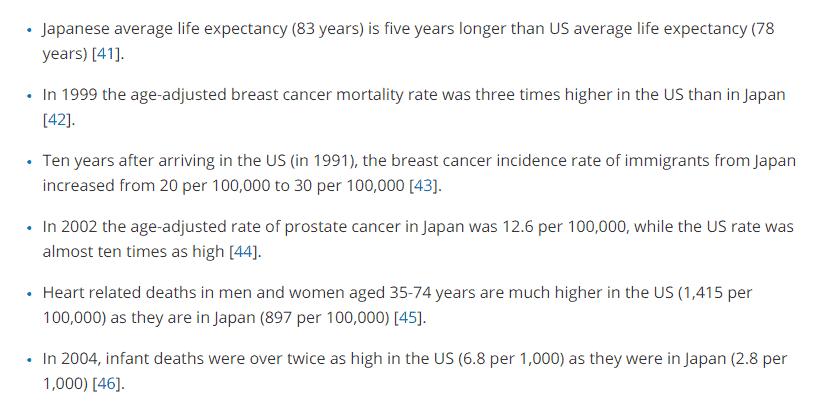
It would be hard to attribute all of these benefits to seaweed and kelp intake, but it should be considered as part of the equation.
Kelp supplements should be differentiated from pure iodine supplements due to their natural source and their added vitamin content.
Liquid Iodine & Iodide vs Iodine
Your thyroid isn’t the only tissue in your body to utilize iodine.
In fact, almost every cell in your body needs iodine to function optimally.
Iodine deficiency causes a different set of symptoms depending on where it occurs in your body:
- Low iodine in breast tissue may result in fibrocystic breast disease
- Low iodine in the skin tissue may result in reduced sweat production
- Low iodine in your thyroid may result in hypothyroidism
- Low iodine in your salivary tissues may result in dry mouth, etc.
This matters because there are two forms of iodine that the body can use. Some tissues are able to utilize iodine while others require iodide (28).
Your thyroid, salivary glands, and skin cells all use iodide, while your breast, prostate, and stomach all utilize iodine.
Enter liquid iodine supplements.
These iodine supplements contain a combination of both iodine and iodide.
This blend provides a source of iodine that every tissue in the body can use.
The only downside to using liquid iodine is that it tends to come in powerful concentrations.
At 2% each of a standard liquid iodine contains approximately 1.0 mg of iodine and 2.0 mg of potassium iodide.
One big benefit of liquid iodine is that it’s easy to titrate doses. The only downside is that the starting dose is typically much higher than the RDA dosing.
Liquid iodine can be compared to other forms of iodine like Iodoral which contain both iodine and iodide in fixed amounts, usually in 12.5mg increments.
The higher doses found in liquid iodine solutions tend to be better for treating conditions like fibrocystic breast disease and prostatic issues but are typically not great for those treating thyroid dysfunction like hypothyroidism and Hashimoto’s.
If you have any of these extra thyroidal conditions then using higher doses of iodine may be worth it but proceed with caution if you are trying to treat a thyroid-specific problem.
Symptoms when taking Iodine
Not all patients will experience side effects while taking Iodine which is why I’ve included this section.
Taking Iodine can precipitate negative symptoms, especially in certain patients with Hypothyroidism and Hashimoto’s.
In most cases these negative side effects result from taking too much iodine too quickly and when taking iodine without other supplements such as selenium and/or iron.
If proper precautions are taken then in most cases you shouldn’t experience negative side effects of taking Iodine, but some patients tend to be more sensitive than others.
Negative symptoms of taking Iodine supplements:
- Worsening hypothyroid symptoms
- Increased fatigue
- “Flu-like” symptoms
- Body aches
- Skin eruptions(felt to be secondary to bromoderma or liberation of bromide from the body)
- An increase in TSH(felt to be secondary and a normal response in most cases, but some have supposed this to be a negative symptom and the onset of subclinical hypothyroidism)
- An increase in thyroid antibody levels
Two things should be considered when evaluating these symptoms:
First:
When you stop taking iodine the negative symptoms of iodine reverse rapidly
and…
Second:
Despite these potential issues, it’s felt that the benefits of taking iodine outweigh the potential risks (29).
Like anything, it’s important to be informed about all of the potentially positive side effects, in addition to the potential negative side effects as well.
Will taking Iodine help with weight loss?
One question that many of you are wondering is whether taking Iodine help with weight loss.
Like most things, there is no easy answer but if there were it would be maybe.
As you know weight loss depends on a number of factors (including proper thyroid function).
If you have hypothyroidism (or even suboptimal thyroid hormone function) due to suboptimal iodine levels or a frank iodine deficiency then taking iodine may help you lose weight.
Weight loss related to iodine supplementation is more likely to be related to a combination of factors.
Improved energy levels resulting in increased activity.
Increased thyroid hormone resulting in increased basal metabolic rate.
Increased thyroid hormone results in more muscle mass.
Increased activity level due to increased energy.
All of these factors likely play a role in helping patients lose weight when supplementing with iodine.
Having said that I wouldn’t go into this with the expectation that you will lose a ton of weight.
Instead, focus on your symptoms and improving how you feel and any weight loss that occurs will simply be an added bonus.
Foods high in Iodine & How to get iodine with your diet
If you prefer to try and get iodine from foods, then you can use this list below to try and increase your dietary intake of iodine.
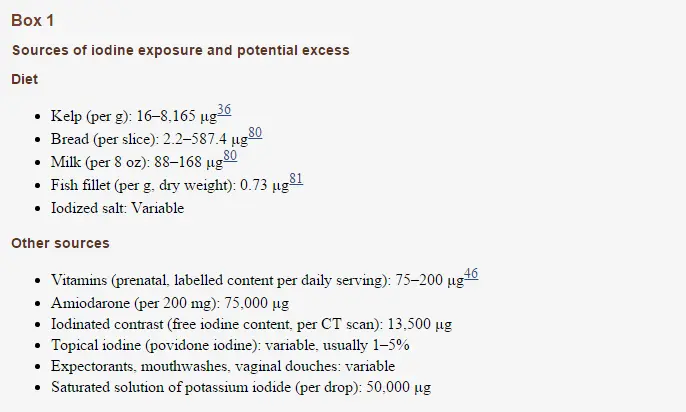
Be careful of consuming large quantities of iodine from food sources, however.
If you do decide to use food as your primary source of iodine then I would recommend that you start out slow and try to follow the guidelines set in place by the Japanese.
We know that in most cases eating food to get you to the 1,000mg to 3,000mg range will likely not cause any problems.
While some patients may need more due to various factors, I would recommend assessing this case by case.
Foods high in iodine:
- Seaweed, kelp, and other sea vegetables (contain the most iodine)
- Wild-caught cod (66% of daily recommended intake)
- Organic and grass-fed yogurt (50% of recommended daily intake)
- Raw milk (37% of recommended daily intake)
- Eggs (16% of recommended daily intake)
- Cheese (8% of daily intake)
- Lima beans (10% of daily intake)
- Bananas (2% of daily intake)
Recap & Final thoughts
Iodine is required for optimal thyroid function and nowadays many patients may actually be deficient or suboptimal in iodine due to a variety of reasons including:
- Decreased absorption of iodine due to hormonal changes
- Reduced iodine uptake in the thyroid gland due to harmful chemicals
- Increased demand for iodine metabolism due to certain states
- And deficiencies due to poor diet or nutrient-depleted soil
Because of these reasons even people who live in iodine “replete” areas may actually be deficient in iodine.
Replacing iodine stands to be helpful in many cases but in order to supplement safely with iodine you should make sure that both your selenium and iron stores in your body are optimal.
Supplementing with iodine in a small subset of people may actually reduce thyroid function.
To prevent any negative side effects it’s best to start low and go slow with iodine replacement.
Levels up to 3.0mg per day have been shown in studies to be safe and this mimics the average daily intake of the Japanese who live long healthy lives.
Scientific References
#1. https://www.ncbi.nlm.nih.gov/pubmed/1915648
#2. https://www.ncbi.nlm.nih.gov/pubmed/27700539
#3. https://www.ncbi.nlm.nih.gov/pubmed/9703374
#4. https://www.ncbi.nlm.nih.gov/pmc/articles/PMC4805050/
#5. https://www.ncbi.nlm.nih.gov/pubmed/18590348
#6. https://www.ncbi.nlm.nih.gov/pubmed/22742605
#7. https://www.ncbi.nlm.nih.gov/pubmed/15734706
#8. https://www.ncbi.nlm.nih.gov/pubmed/11507648
#9. https://www.ncbi.nlm.nih.gov/pubmed/11939028
#10. https://www.ncbi.nlm.nih.gov/pmc/articles/PMC501258/
#11. https://www.ncbi.nlm.nih.gov/pubmed/9549759
#12. https://www.ncbi.nlm.nih.gov/pmc/articles/PMC3266621/
#13. https://www.ncbi.nlm.nih.gov/pubmed/19178515
#14. https://www.ncbi.nlm.nih.gov/pmc/articles/PMC3266621/
#15. https://www.ncbi.nlm.nih.gov/pubmed/24246349
#16. https://www.ncbi.nlm.nih.gov/pubmed/24908244
#17. https://www.ncbi.nlm.nih.gov/pmc/articles/PMC3266621/
#18. https://www.ncbi.nlm.nih.gov/pubmed/12487769
#19. https://www.ncbi.nlm.nih.gov/pubmed/12487769
#20. https://www.ncbi.nlm.nih.gov/pmc/articles/PMC1710988/pdf/canmedaj00491-0087.pdf
#21. https://www.ncbi.nlm.nih.gov/pubmed/16131334
#22. https://www.ncbi.nlm.nih.gov/pmc/articles/PMC3752513/
#23. https://www.ncbi.nlm.nih.gov/pubmed/20363723
#24. https://www.ncbi.nlm.nih.gov/pubmed/343535
#25. https://www.ncbi.nlm.nih.gov/pmc/articles/PMC3752513/
#26. https://www.ncbi.nlm.nih.gov/pmc/articles/PMC3752513/
#27. nature.com/articles/s41430-020-0677-5
#28. https://www.ncbi.nlm.nih.gov/pubmed/7577324
#29. https://www.ncbi.nlm.nih.gov/pubmed/10672891
